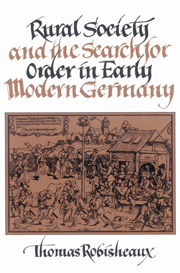Book contents
- Frontmatter
- Contents
- List of illustrations and tables
- Acknowledgments
- A note on usages
- Glossary
- List of abbreviations
- Introduction
- Part One Agrarian expansion, revolt, and the decay of community
- Part Two Search for order
- Part Three Crisis and recovery
- 8 Crisis
- 9 Agrarian order restored
- 10 Village society and the practice of state power
- Appendix A Distribution of wealth in Langenburg district, 1528–1581
- Appendix B Grain production and the peasant household
- Manuscript sources
- Bibliographical essay
- Index
10 - Village society and the practice of state power
Published online by Cambridge University Press: 05 May 2010
- Frontmatter
- Contents
- List of illustrations and tables
- Acknowledgments
- A note on usages
- Glossary
- List of abbreviations
- Introduction
- Part One Agrarian expansion, revolt, and the decay of community
- Part Two Search for order
- Part Three Crisis and recovery
- 8 Crisis
- 9 Agrarian order restored
- 10 Village society and the practice of state power
- Appendix A Distribution of wealth in Langenburg district, 1528–1581
- Appendix B Grain production and the peasant household
- Manuscript sources
- Bibliographical essay
- Index
Summary
In 1773 a newly published manual for rural householders drew public attention in Germany to the small land of Hohenlohe. The author of this manual, Johann Friedrich Mayer, a pastor from Kupferzell, was fast becoming known for his zealous efforts to reform agriculture and village society in his native land and in Germany. His voluminous correspondence and his treatises show a reformer who fought for numerous causes: improvements in fertilizer, the introduction of a more rational labor calendar, religious and moral instruction of young people, free trade, the planting of potatoes, the reform of the laws that governed inheritance and landholding, and the abolition of labor services. By the time he died he had accumulated five prizes for his works on agrarian reform, including coveted awards from the Elector Palatine of the Rhine, the Margrave of Ansbach, and Empress Maria Theresa. But it was his Lehrbuch für die Landund Hauswirte that earned him his fame as a quintessential agrarian reformer of the late eighteenth century.
What is striking about this work, what draws my attention to it as I conclude this study, is not the content of Mayer's ideas. It is instead the social drama that unfolded as Mayer tried to put his reforms into practice. For that drama, hidden from the view of those who simply read the manual, pointed up patterns of relationships typical in a small German patrimonial state of the early modern period.
- Type
- Chapter
- Information
- Rural Society and the Search for Order in Early Modern Germany , pp. 257 - 263Publisher: Cambridge University PressPrint publication year: 1989



